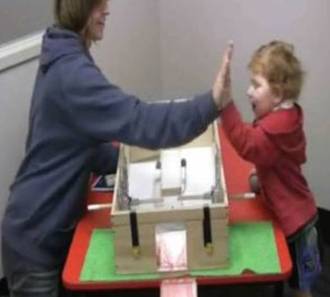Shop
01603
https://www.under5s.co.nz/shop/Hot+Topics+Articles/Child+Development/Early+Pro-social+Development.html
Early Pro-social Development
|
Check out our research findings to determine how parent-child interactions foster cooperation, what babies understand about working together and what babies think of good versus bad co-operators.
|
You might also be interested in ...
Spotting a left-handed child
Will your child be left-handed? What are the chances of them preferring to use their left hand over their right? Statistics show that approximately 1 in 10 people worldwide are left-handed. However there appears to be no set age as to when children show a preference over using their left hand instead of their right.
How gender affects kids learning & play
We take a look at children’s play choices and what we can do as parents and caregivers to help change gender stereotypes and encourage learning without bias.
join usJoin us on social media for all our latest news. |
sign upSign up and receive our latest newsletters. |
|







How do parent-child interactions foster cooperation?
What we wanted to know: Children gain valuable experience about what it means to cooperate by playing games with peers, siblings, adults and their own parents.Previous research tells us that children understand cooperation within the first two years of their lives and this shows us the developmental trajectory of cooperative competence in early childhood. In this study we wanted to find out how parent-child interactions foster children’s cooperative ability.
What we did: In this study, parent and child took part in cooperative games and we tried to identify the approaches parents took to teach their children how to play a new cooperative game.
The child then played the same games with the experimenter. Here we tried to find out whether a particular parental teaching style is related to a child’s competence in cooperative activities. We are currently in the process of analyzing the results.
Future Directions: We will be running the same study in Iran to explore whether there are any differences between parents from Iran and New Zealand in how they teach their children about cooperative games.
What do babies understand about working together?
What we wanted to know: Can 12-month-old infants identify situations in which actors are cooperating to attain a common-goal and situations in which actors are working independently to attain their individual goals? Previous studies have shown that 14-month-olds can identify cooperative and non-cooperative settings.What we did: In the habituation phase, babies were repeatedly shown two actors working together to get a toy from inside a box. Once the babies habituated to this, babies were shown one of the two actors grabbing either the toy or the box. If babies looked longer when the person grabbed the box (compared to if the person grabbed the toy), this would suggest to us that babies have worked out that the toy was the cooperative goal.
What we found: Preliminary results suggest that 12-month-old infants do not yet understand that the actions of cooperating partners are linked to the same goal. Thus, 12- to 14- months may be a transitional period for infants’ understanding of cooperation.
What do babies think of good versus bad co-operators?
What we wanted to know: We know that by 14 months, infants already understand that cooperation is a task where two people work together to achieve a goal. In this study, we wanted to find out if babies use information from watching others cooperate to predict how they might behave in the future.What we did: Babies were shown a series of videos in which two people were building a toy tower. In some cases, they were successful, and in other cases, they were not. Using eye-tracker technology, we were able to measure where the infants were looking!
What we found: Preliminary results suggest that infants don’t use information about an individual’s past behaviour to make judgments about how they would behave in a different situation that involves cooperation. But we still have to look at the eye tracking results to see what other interesting things it tells us!
Check out our other Hot Topics on:
- Early brain development and learning
- Early language learning
- Early eating habits
Source: This article was written by Early Learning Lab.